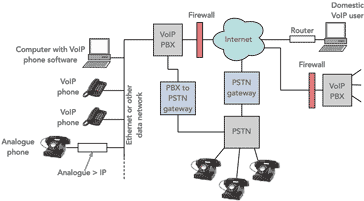How to Choose the Best VoIP Service Provider
Top tips and guidelines on the steps to take to ensure you choose the best VoIP service provider for your requirements.
Voice over IP, VoIP Includes:
VoIP basics
VoIP phones
How to choose best VoIP service provider
No two VoIP service providers are exactly the same, so it pays to choose the best service provider for your particular situation.
Knowing how to select the best service provider, and having a logical process with questions to answer and points to consider can greatly help in the process.
With many users wanting to migrate their business telephone systems to VoIP and along with this, many small enterprises want to gain the most from new telecommunications technology whilst also reducing costs.
VoIP is also a technology that is being adopted by many domestic users as well as it can provide some considerable advantages in both cost and capability which can be very useful for many homes.
Consider what you want from VoIP
When selecting the VoIP service provider, one of the first questions to ask is what is needed. Take some time looking into this - at one end of the spectrum it is possible to replace the older analogue phones with VoIP phones, but in doing just that, many of the considerable advantages of VoIP may be missed.
It is worth taking some time looking at what a new VoIP service could provide. Different VoIP service providers will have different offerings, so when considering what is needed, it may be worth seeing what is on offer and how it could be used and incorporated into the business telephone system.

Note:
PSTN - public service telephone network,
PBX - private branch exchange
As VoIP essentially sends data from one phone or endpoint to another, there is far more flexibility and capability with a VoIP phone system than with a traditional one.
It pays to take some time to also understand what VoIP is. Do some research into how VoIP works and what it might be able to achieve. In this way it is possible to ask the questions you want, and the VoIP service provider will know to provide the right answers and a system that you want rather than one that is just easy for them to provide.
Take some time to think "outside the box" because it is possible to implement a VoIP service in a way that might change working processes for the better. Don't just use VoIP as an almost like for like replacement for an old analogue system. There could be some significant facilities and ways of implementation that would be of great benefit.
What phones are needed
There are many options that can be considered for the phones to be used with the system being installed by the VoIP service provider. There are far more options than those that were possible using the old analogue or POTS, plan old telephone system, phones. It is worth taking some time to consider these as VoIP offers many options.
It is possible to just replace new for old, but some opportunities might be missed, so consider the options available:
- Traditional style handset: One option for a phone is to use a VoIP version of the traditional analogue handset. These phones are far more sophisticated and offer a host of different capabilities. However they are more expensive than the old analogue phones and this cost may not be needed in every instance if other options are to be considered.
- Computer based phone: It is possible to incorporate the phone into the computer using an application. The only hardware that is typically needed is a headset with microphone - this is needed so the whole office does not hear both sides of the conversation! An application can then be installed onto he computer. Using this approach the computer can be used as the brains behind the phone and it is possible to achieve concepts like screen sharing and the like and this helps in conference calls. It also considerably reduces the costs of the hardware. Applications like Skype can achieve this and also make Skype to Skype calls for free, and to landlines for a charge - this may be part of the overall contract cost. Other applications are available to achieve similar functionality.
- Smartphone: In the same way that Skype and other telephony applications can be installed on a computer, they can also be incorporated into smartphones giving mobility as well as functionality - but be aware that video conferencing can use appreciable amounts of data.
Smartphones offer a really attractive option for many VoIP applications - they are ideal for Skype and particularly Skype to Skype calls. However be aware that they do not always seem to integrate as seamlessly into business telephone systems as the applications are more geared towards these of desktops. This is obviously dependent upon the VoIP service provider and the applications used, but it is a point worth investigating.
VoIP features
There are many features that VoIP services can provide. There are some basic items like the list below which may come as part of the package:
- Caller ID
- Voicemail
- Call waiting
- 3-way calling
- Conference calls
VoIP can offer some advanced features beyond some of the basics mentioned above, so it worth considering what is on offer and whether the features available would enhance the business. Also these capabilities should be provided for little or preferably no cost.
Items like conference cals where several people can all enter the same conversation are particularly useful for many businesses and should be incorporated into the business telephone system requirements.
VoIP service provider cost structure
One of the key aspects of the selection of a service provider is the cost and how this will work out into e long term. It is necessary to consider not only the basic cost but also issues like support and reliability.
There is not use in selecting a particular provider if the reliability is poor, or therein an issue and no support is available.
Benjamin Franklin's saying that the bitterness of poor quality remains long after the sweetness of low price is forgotten is particularly true in this instance. So cost must be balanced against the other aspects of the issue to ensure that the overall optimum cost is achieved. The service quality and the features available must all be considered together.
International calling
With much more international business taking apace than many years ago, there can be a greater need for international calling.
Dependent upon the VoIP service that is offered, International calls an be very much cheaper than if they are made via the older analogue circuit switched connections.
If calls like Skype to Skype, i.e. with no connection tot he PSTN, are made, then these can often be free to wherever the call is made.
If the call plan provided by the VoIP service provider includes lower cost or free calls to some counties, then make sure these are the countries you call most often, or negotiate the deal to this end.
Service quality
One of the key issues with selecting an VoIP service provider is that the quality of what is provided comes up to expectations. As many people using a business telephone system will spend a lot of time not he phone contacting customers, etc, it is essential that any service works well. Also for domestic usage, there is no point in having a system that does not perform even if it is low cost.
There are many aspects to service quality, but it must be remembered that it is necessary to have a good quality broadband connection for VoIP to work reliably whether it is provided by the VoIP service provider or another broadband provider. It should not have service dropouts as sometimes happens and it should also have sufficient bandwidth - any fibre connection should be suitable, although if a lot of people are likely to be video conferencing or screen sharing at the same time, then this can use a lot of bandwidth. The VoIP service provider should be able to advise onto is.
Customer support
Whilst it may be expected that the introduction of a VoIP telephone system will be trouble free, this is seldom the case. Also issues can arise after the first introduction. As businesses depend on their phones systems to enable everything to move forwards, swift phone responses 24 hour a day and seven days a week could be essential.
It is essential to ensure that support is available to the required degree. This may be as part of the overall package for the business telephone system, or it there may be certain levels of service available. Check what is needed and then ensure this is provided.
Availability of local area codes
Often VoIP phone systems use dialling cues that may not be linked to a local area. In some instances this may not be an issue, but for domestic use and for area based business, a local phone number can be of benefit.
Friends calling domestic lines from an analogue phone may be charged long distance rates, and also for business telephone systems, the local code can seem more approachable if the business is local in nature.
Consider whether this is an issue - most VoIP service providers will be able to provide a local number if required.
Emergency calls
Although it is hoped that any emergency calls would never be required, there should be a capability to make these calls. Using a VoIP network, the cals are routed via the Internet where location information is not directly available and not directly into the PSTN where caller locations are associated with a number. As a result emergency calls can be more difficult to connect. The IP network may not even know where the most local fire station is - it could be anywhere in the world!
The way VoIP service providers overcome this is to associate the VoIP PBX or various phones with locations. Ensure this can be achieved with any VoIP provider. On the very few occasions when it might be needed, it could save lives.
If time is taken to select the right VoIP service provider, then the system installed can offer some great benefits: it will enable the business or home to benefit from the latest developments in telecommunications as well as having flexibility to move forwards for the future. As VoIP is software based, many of the developments can be incorporated by simply upgrading the software.
With the right VoIP service provider and a good relationship: ease of support and general access, the update to VoIP can be a great investment in the future for the business or home.
 Written by Ian Poole .
Written by Ian Poole .
Experienced electronics engineer and author.
Wireless & Wired Connectivity Topics:
Mobile Communications basics
2G GSM
3G UMTS
4G LTE
5G
Wi-Fi
Bluetooth
IEEE 802.15.4
DECT cordless phones
Networking fundamentals
What is the Cloud
Ethernet
Serial data
USB
LoRa
VoIP
SDN
NFV
SD-WAN
Return to Wireless & Wired Connectivity




